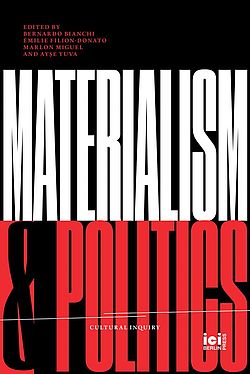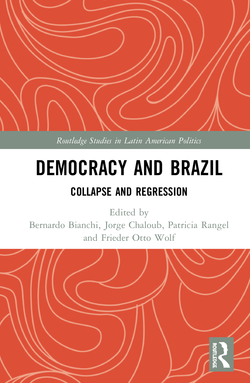Bernardo Bianchi | Forscher Fellow

Fachbereich
:
Philosophie
,
Politikwissenschaft
|
Biographie
Bernardo Bianchi ist Gastprofessor an der Universidade de São Paulo, Brasilien (Abteilung für Philosophie - FFLCH). Zuvor war er Fellow der Alexander von Humboldt Stiftung (AvH) und Fellow der Koordinierungsstelle für die Fortbildung des Personals des Hochschulwesens der brasilianischen Regierung (CAPES) am Institut für Philosophie der Goethe-Universität Frankfurt am Main als auch am Institut für Philosophie der Freien Universität Berlin (FU-Berlin), wo er zugleich als Gastdozent gelhert hat. Der ihm im Jahre 2015 zuerkannte Doktortitel gilt zugleich in Philosophie (Universität Paris 1, Panthéon-Sorbonne) und in Politikwissenschaft (Landesuniversität Rio de Janeiro, IESP-UERJ).
Stipendium
Doktorarbeit (2009-2015)
- CNPq (Nationale Rat für Wissenschaftliche und Technologische Entwicklung der brasilianischen Regierung) und FAPERJ (Carlos Chagas Filho Stiftung für die Unterstützung der Forschung im Bundesland Rio de Janeiro)
Postdoc (2016-2019)
- AvH (Alexander von Humboldt Stiftung) und CAPES (Koordinierungsstelle für die Fortbildung des Personals des Hochschulwesens der brasilianischen Regierung)
Forschungsthema
Bernardo Bianchis hauptsächliche Forschungsinteressen liegen auf den Gebieten der politischen Philosophie, der Geschichte der Philosophie und der zeitgenössischen politischen Theorie, sowie Gesellschaftstheorie. Seine Dissertation untersuchte den Gedanken der Transformation bei Spinoza und bei Marx.
Titel der Dissertation
Der rote Faden der Transformation: Marx und Spinoza
Zusammenfassung der Dissertation
Ces dernières décennies, la relation entre Spinoza et Marx a été abordée par des auteurs comme Louis Althusser, Antonio Negri et Maximilien Rubel. Néanmoins, bien que l'on puisse établir un lien entre les deux au niveau des affinités théoriques, il manque une analyse du rapport entre ces affinités et les références effectives que Marx fait à Spinoza. Nous ne savons pas davantage, jusqu'à maintenant, comment ces références s'articulent avec les objectifs du militantisme philosophique et politique que Marx s'est fixé tout au long de sa vie. La présente étude cherche donc à parcourir les premières oeuvres de Marx de manière à y étudier la présence de Spinoza, et à démontrer simultanément à quels buts cette présence était subordonnée. Parallèlement, et de façon tout aussi importante, il s'agit de montrer que, bien que ces usages font apparaître la façon dont Marx s'est éloigné de Spinoza, ils n'en révèlent pas moins que, dans cet éloignement, Marx finit par retrouver, non pas tant Spinoza, mais le spinozisme
Betreuer
Projekte
Im Rahmen seiner weitergehenden Forschungen untersucht Bernardo Bianchi gegenwärtig die Möglichkeiten einer Aktualisierung des Begriffs der Emanzipation, auf der Grundlage von historischen Analysen zu diesem Begriff und von normativen Rekonstruktionen seiner Bedeutung. Im Ausgang von einer Untersuchung des Verhältnisses, in dem die Problematik der Emanzipation zu der der im Begriff der Revolution enthaltenen steht, wird dann nachgewiesen, wie stark der erstere Begriff in einer erheblichen Mehrdeutigkeit befangen bleibt, aufgrund derer es ihm niemals gelingt, sich im Hinblick auf den Übergang zum Handeln auf Seiten der Menge der Vielen (multitudo) auf einen bestimmten Sinn festzulegen.
Wissen repolitisieren
(AvH) Paradoxa der Emanzipation
Mitglieder: Jorge Chaloub (UFRJ), Bruna Coelho (CMB), Maria Luiza Cracel (USP), Thiago Dias (USP), Katia Genel (CMB/Paris 1), Edward Guetti (CMB/American University), Bénédicte Laumond (CMB/Université de Versailles), Benito Maeso (USP/UFPR), Maria Fernanda Novo (USP), Luís César Oliva (USP), Marianna Poyares (The New School), Homero Santiago (USP), Mariana Simoni (CMB/FU Berlin), Jefferson Viel (USP/UFU), Ayşe Yuva (CMB/Paris 1)
Am 2. und 3. März 2023 versammelte sich eine Gruppe von Forschern mit unterschiedlichem akademischem und nationalem Hintergrund an der Universität von São Paulo, um die spezifischen Schwierigkeiten und Paradoxien zu diskutieren, mit denen alle emanzipatorischen Projekte in einer Ära der "Post-Wahrheit" konfrontiert sind.
Bericht über den Workshop in Sao Paulo.
Crédit image: Représentation de la scène du film "Terre en transe", de Glauber Rocha, (Difilm production, 1967) par la Companhia Teatro da Vertigem, 2013, Roberto Rezende, Roberto Áudio, João Attuy und Renato Caetano
Materialism and Politics
02.März 2021Ayse Yuva , Bernardo Bianchi , Emilie Filion-Donato, Marlon Miguel
Collection: Cultural Inquiry
ISBN: 978-3-96558-018-3
What remains of materialism’s subversive potential — i.e., its ties with heresy or atheism and republicanism or communism — and to what extent does this concept still interpellate us politically and philosophically?
As neoliberal policies expanded far beyond the state, their mechanisms of control seeped into the materiality of social reproduction, solidifying a conception of matter as something inert, to be appropriated, manipulated, and exploited. If in this context the subversive nature of a reference to materiality is called into question, it has also provoked new forms of resistance, as well as fundamental reconsiderations of the political implications of the notion of ‘matter’.
Against this background, the aim of this book is to show the diversity within continued engagements with materialism as a central concept for progressive politics, be it in the direction opened up by New Materialism, in renewed forms of Marxist and Spinozist based approaches, or in feminist analyses, each in their own terms, without excluding the possibility of alliances between them.
Finally, this volume insists that the study of materiality and materialist approaches does not amount to a renunciation of philosophy, but rather urges us to broaden the task of philosophical thought in order to reconsider the historical and, in every sense of the word, material situatedness of all philosophical problems. Against a reductive and ahistorical conception of materialism — the straightest way back to ideology —, this book offers an analysis of its diverse emancipatory potentialities.
Democracy and Brazil. Collapse and Regression
23.September 2020Bernardo Bianchi , Jorge Chaloub, Patricia Rangel, Frieder Otto Wolf
Routledge Studies in Latin American Politics
Edition: Routledge
Collection: Routledge Studies in Latin American Politics
ISBN: 9780367897680
Democracy and Brazil: Collapse and Regression discusses the de-democratization process underway in contemporary Brazil.
The relative political stability that characterized domestic politics in the 2000s ended with the sudden emergence of a series of massive protests in 2013, followed by the controversial impeachment of Dilma Rousseff in 2016 and the election of Jair Bolsonaro in 2018. In this new, more conservative period in Brazilian politics, a series of institutional reforms deepened the distance between citizens and representatives. Brazil's current political crisis cannot be understood without reference to the continual growth of right-wing and ultra-right discourse, on the one hand, and to the neoliberal ideology that pervades the minds of large parts of the Brazilian elite, on the other. Twenty experts on Brazil across different fields discuss the ongoing political turmoil in the light of distinct problems: geopolitics, gender, religion, media, indigenous populations, right-wing strategies, and new forms of coup, among others. Updated analyses enriched with historical perspective help to illuminate the intricate issues that will determine the country's fate in years to come.
Democracy and Brazil: Collapse and Regression will interest students and scholars of Brazilian Politics and History, Latin America, and the broader field of democracy studies.
Publikationen
Past 5 years
A) Publications with peer review process
1. Bianchi, B. (2017) "Les affinités aléatoires: une contribution à l’étude du rapport Spinoza-Marx" (Aleatory Affinities: A Contribution to the Study of the Spinoza-Marx Relationship). In: Asterion: philosophie, histoire des idées, pensée politique (Lyon), V. 16.
2. Bianchi, B. (2015) "Revolução: da anakyklosis à utopia liberal de Sieyès" (Revolution: from anakyklosis to the liberal utopia of Sieyès). In: Lua Nova (São Paulo), V. 97.
3. Bianchi, B. (2015) "Vauvenargues: un moralista sedicioso" (Vauvenargues: a seditious moralist). In: Revista Ingenium (Madrid), V. 9, P. 51-74.
4. Bianchi, B. (2014) "As astúcias da cumplicidade: da suposta influência de Spinoza sobre Marx" (The cunnings of complicity: Spinoza and Marx). In: Cadernos Espinosanos (São Paulo), V. 30, P. 75-93.
5. Bianchi, B. (2013) "Filosofias para a segunda natureza: estratégias do finito em Vauvenargues" (Philosophies for the second nature: strategies of finite). In: Revista de Estudos Políticos (Rio de Janeiro), V. 7 (2013/2), P. 86-107
A.1) Publications accepted but not yet published::
6. Bianchi, B. (2018) "Marx’s reading of Spinoza: on the alleged influence of Spinoza on Marx". In: Historical Materialism (London).
B) Publications without peer review process
7. Bianchi, B. (2017) "Dois conceitos de emancipação" (Two concepts of emancipation). In: Ao Largo (Rio de Janeiro), V. 4, P. 42-55.

